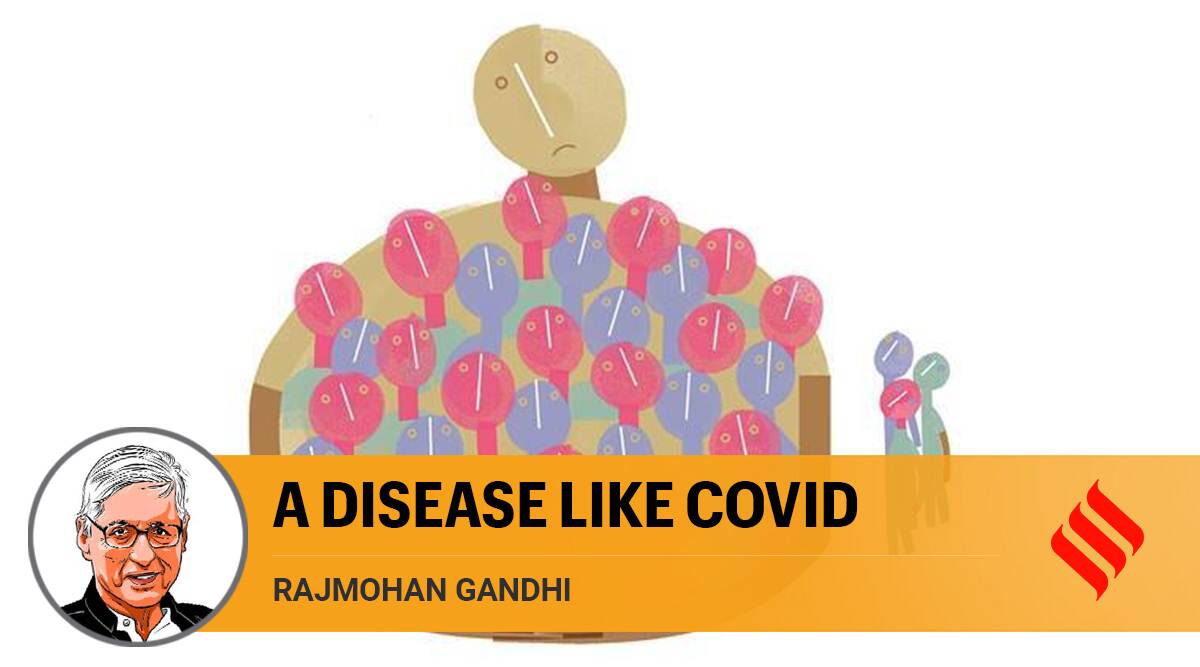
by Rajmohan Gandhi
The idea that a nation belongs to its dominant section, be that section racial, tribal, linguistic or religious, has been termed ethnonationalism. True believers would like to see democracy’s mansion of equality submerged. In its place, they would have a pyramid of hierarchies where those dominating are sharply demarcated from the dominated.
Ethnonationalism is an academic word for the raw force feeding on hate and contempt. Much of the Indian subcontinent saw this force erupt in violence in 1947. The region that became Bangladesh faced the outburst in 1971. Delhi experienced it in 1984, the Balkans in the 1990s, Rwanda in 1994, Gujarat in 2002.
In recent years, the idea of ethnonationalism has made global strides. Bringing countries like Poland, Hungary, Brazil and Turkey under its sway, it has appealed also to many in long-established democracies, including the US. Last winter, its rising tide was arrested when American voters rejected Trump.
When, in the wake of the January 6 attack on the Capitol, the FBI publicly named “domestic terrorism” by white nationalist groups as a serious threat, it was putting in place a fresh reinforcement against the tide. Far-right Trump-backers in the US Congress, including Marjorie Taylor Greene of Georgia and Matt Gaetz of Florida, both in the lower house, want such tide-breakers removed. Fortunately for lovers of democracy, these elements received a pushback when the house’s Republican leadership frontally denounced a call for preserving a “uniquely Anglo-Saxon” culture in the US.
Reportedly endorsed by Greene and Gaetz, this call was unmistakable code for a white-dominated America. Rebuffing it, Kevin McCarthy, who leads the Republicans in the lower chamber, tweeted that America “isn’t built on identity, race, or religion,” adding, “The Republican Party is the party of Lincoln and the party of more opportunity for all Americans — not nativist dog whistles.” Liz Cheney, ranked third in the house’s Republican leadership, declared: “We teach our children the values of tolerance, decency and moral courage. Racism, nativism, and anti-Semitism are evil.”
It is impossible for me not to contrast these candid words with the apparent silence of Narendra Modi, Amit Shah and J P Nadda at the widely publicised words of persons like Yati Narsinghanand, the chief priest of Ghaziabad’s Dasna Mandir. I have seen no denials anywhere of published reports that Yati Narsinghanand has urged Hindus to “stop behaving like eunuchs”, “buy the best weapons (you) can” and “finish off” Muslims.
People like Narsinghanand see no need for dog-whistles or code language. They show no fear of the law. Even more troublingly, their words do not seem to invite any objection from those who are running India. The silence from influential quarters that allowed some nations to fall from democracy and the rule of law into violent extremism seems an ominous presence in today’s India.
Is India an isolated small land that can shut the world off and do as it pleases? Half our livelihood comes from trading with the world. Millions of Indians live elsewhere, including in the Gulf and other Muslim-majority lands. People of Indian-origin help in the running of major nations, including the US, the UK, Canada and Ireland. The defence of India’s borders depends on supplies from other countries. Our lives hang on vaccines devised abroad.
Modi wants friendship from Bangladesh, a role in Afghanistan, more trade with the Gulf, oil from Iran, Iraq and Saudi Arabia, and, in these tough Covid times, the understanding of the world as a whole, including democracies like the US. If he thinks that all this will be forthcoming even if his government remains silent in the face of open calls for hate and violence against Muslims and Christians, then the conclusion may indeed be drawn that the cave is his preferred home. He surely knows that those calling publicly for violence against India’s Muslims and Christians have no goodwill for him or his government. In fact, they are creating problems for him. Modi must in clear language tell the Indian people and the world that his government will protect tolerance, decency and equal human rights.
Though he was killed 73 years ago, Gandhi remains an object of dislike for India’s ethnonationalists, who see virtue in hating the Other, the paraya, the “not apna”. However, since Modi claims to respect him, let me recall two observations that Gandhi made about a hundred years ago, long before freedom was near.
Rejecting the option of whipping up hatred against the British, Gandhi wrote in August 1925: “I cannot love Muslims or Hindus and hate Englishmen. By a long course of prayerful discipline, I have ceased for over forty years to hate anybody.” (Young India, August 6, 1925).
A year later, he repeated the thought: “We cannot love one another if we hate Englishmen. We cannot love the Japanese and hate Englishmen. We must either let the law of love rule us through and through or not at all. Love among ourselves based on hatred of others breaks down under the slightest pressure…” (The Hindu, August 11, 1926)
Whether it targets the Englishman or the Muslim, hate remains hate. And, like Covid, it is no one’s friend.
This story first appeared on indianexpress.com

